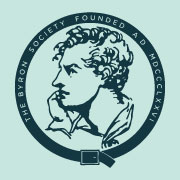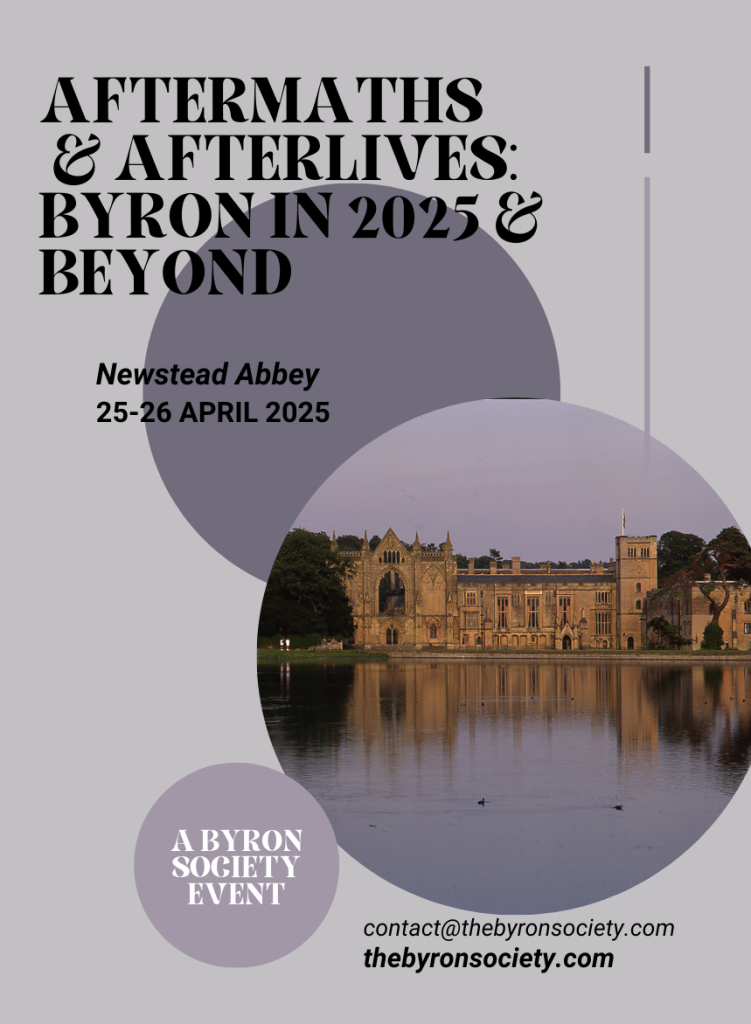By Peter Gallagher, part of the Why isn’t Don Juan Read More series.
Germaine Greer once observed[1] that Don Juan is the greatest comic poem in English. It should be as popular, she thought, as Ariosto’s Orlando Furioso in Italy or, for that matter, Pushkin’s Eugene Onegin in Russia.
True, in my view! Still, if Don Juan enjoyed the popular renown of those “national” poems then every high-school kid would learn to quote it and to read in at least longish excerpts and perhaps return to it as an adult to find things they’d missed the first time around.
Why is Don Juan not like this?
Possibly, the poem is too adult for schools. In a letter to his friend and agent Douglas Kinnaird three months after the publication of Cantos I & II, Byron identified in a boastfully-blokey kind of way what may be the poem’s chief strength:
As to “Don Juan” – confess – confess – you dog – and be candid – that it is the sublime of that there sort of writing – it may be bawdy – but is it not good English? – It may be profligate but is it not life, is it not the thing? – Could any man have written it – who has not lived in the world? – and tooled in a post-chaise? – in – a hackney coach? – in a Gondola? against a wall? in a court carriage? – in a vis a vis? – on a table? – and under it? (Byron to Kinnaird, 26 October 1819)
In fact Cantos I & II have no racy content, but Don Juan is a poem of the world.
For example, the bedroom farce of Canto I is rather modest — at most suggestive — in its detail. But to appreciate the jokes about Inez’s machinations, the hint about Juan’s parentage, the reality of Julia’s foolish self-deception and Juan’s semi-conscious innocence, or to understand the comic tensions between Julia and Alfonso in the bedroom scenes, or even to grasp the tone of Byron’s asides about science, marriage, families and infidelity in the poem, readers need some actual worldly experience. Access to Google won’t cut it.
Byron’s intelligence and wit arises from his peerless management of subjects and materials that “everybody knows” because they are mundane and even vulgar.
His revised epigram[2] for the first two Cantos — “difficile est proprie communia dicere” — is entirely accurate. The expectations that Don Juan has of its readers — that they will recognise and appreciate Byron’s satirical willingness to joke about what everyone knows but does not discuss — are a world away from Byron’s own earlier romantic fantasies and from the ‘transcendent’ poetry of Wordsworth, Keats or Coleridge (Shelley is a different case). To be fair, the “Lakers” project, too, was to focus on things that “everybody knows”. But their tame verses expressing “emotion recollected in tranquillity” are comprehensible, at some level, to any teenager. Byron’s poetry is for grown-ups.
Still, it’s the antithesis of solemn. The verse has great energy, endlessly clever rhyme, “real” characters and scenes, jokes and ironies that are — except, possibly, for those that don’t meet contemporary standards of ‘correctness’ — as amusing today as they were two centuries ago.

Whoopee! “Paphian Girls” – John Austen
The vulgarities are apt; the sexual innuendo hilarious. Byron’s language is still either current or antique-but-accessible. The satire still shines and most of its targets are still ‘fair game’: the war between men and women; the hypocrisy of church and state; the deceptions of love; the brevity of youth; the bloody waste of war; the vanity of celebrity; the sexual energy of power; the emptiness of political banners; the vulgarity of the middle-class, etc. etc. There is touching romance, inspirational reflection, supercilious cattiness, hard-won wisdom, cannibalism in a small boat, dwarf-tossing, a ghost story and even cross-dressing.
So what’s not to like!?
Even if we admit that Don Juan is not very suitable for the school-room, it is still curious that it is not more read by adults. I’d like to suggest three plausible explanations, each of which contributes something to the poem’s contemporary status:
- That Don Juan is unnecessary to the modern image of Byron;
- That Byron’s literary fame suffered a sort of accident in the late 19th century that lifted his shorter poetry to the top of the Romantic literary canon, at the expense of his greatest poem;
- That the way we consume literature today makes Don Juan harder to consume than it used to be.
I will explore each of these in a little more detail in a following post. In brief, I doubt that there is much remedy for the first of these. I believe the second reason and the third are linked, however, and that there’s a way to ameliorate the problem.
I suggest that better media can rescue the glories of Don Juan (I’ll explain how later). Interest in Byron’s longer verse could be restored – as interest in Jane Austen’s novels was restored – by better presentation of his works in more accessible media.
More next time…
For more entries in this Series, go to Why isn’t Don Juan Read More?
Peter Gallagher (@madbaddangerous) blogs at https://madbaddangerous.com. He plans to publish an annotated and narrated version of Cantos I and II of Don Juan later this year in celebration of the bi-Centenary of the first publication of greatest comic poem in English.
[1] “Byron” an aticle in the Guardian Books section available at: http://www.theguardian.com/books/2010/jan/24/lord-byron-germaine-greer accessed September 2018 [2] From Horace’s Letter to Piso (On the Art of Poetry, line 128): “It is hard to sing about things we all experience”. Byron’s choice of epigram is ironic. Horace, at this point in his advice to poets, is saying that it is safer to choose some well known “poetic” subject such as “Troy” rather than try to be completely original by dealing with the mundane. But Byron – like Martial and Catullus – intends to take the risk.



